2016最新!一般现在时和现在进行时--讲解与练习题
一般现在时、现在进行时讲解及练习MicrosoftWord文档

一般现在时、现在进行时讲解及练习MicrosoftWord文档一般现在时态一、一般现在时的定义一般现在时是表示现在经常反复发生的动作,存在的状态或习惯性的动作的时态。
二、一般现在时的结构一般现在时用行为动词的原形,但第三人称单数作主语时,动词的词尾要加-s 或- es。
现在以连系动词be 和行为动词read为例,对一般现在时的肯定句、否定句、疑问句及其简略答语的构成以表格形式加以说明:动词肯定句否定句be I am …I am not …You/We/They are …You/We/They are not …He/She/It is ... He/She/It is not …read I/We/You/They read…I/We/You/They/ do notread …He/She/It reads …He/She/It does not read …动词疑问句简略答语(肯定)简略答语(否定)be Am I …?Yes , you are. No, you are not. Are you …?Yes, I am/we are. No, I am/we are not. Are we …?Yes, we/you are. No, we/ you are not. Are they …?Yes, they are. No, they are not.Is he…?Yes, he is. No, he is not.Is she …?Yes, she is. No, she is not.Is it …?Yes, it is. No, it is not.read Do I / we / theyread …?Yes, you / we /they do.No, you / we / theydo not.Does he / she / itread … ?Yes, he / she / itdoes.No, he / she / it doesnot.连系动词be 的各种形式常与代词或not缩写成一个词。
【时态】小学一般现在时与现在进行时讲解及练习

现在进行时
练习2:用is / am / are 填空。
练习3:根据提示回答问题。
练习4:看图用现在进行时写句子。
一般现在时
(一)主语为I/you/we/they
练习2:按要求改写句子。
(二)主语为he/she/it
肯定句否定句一般疑问句Zoe/like/sports
Dave/live/in London
She/cry/in the bedroom
练习2:按要求写句子。
练习3:按要求改写句子。
(三)一般现在时总结
练习1:选择适当的助动词填空。
练习2:句型转换。
练习3:根据提示完成短文。
一般现在时与现在进行时
练习1:改为否定句。
练习2:改为一般疑问句。
练习3:选择适当的词填空。
练习4:选择适当的词。
练习5:用now或者every day 填空。
练习6:用am / is / are 或者do / does 填空。
练习7:根据提示回答问题。
练习8:根据用一般现在时或现在进行时提示写句子。
一般现在时与现在进行时讲解及练习

一般现在时一、定义与讲解:一般现在时表示经常或习惯性的动作或一般性事实。
,也可表示现在的状态或主语具备的性格和能力。
通常与副词every day(每天),always(总是),usually(通常),often(经常)sometimes (有时),等时间状语连用。
例:(1)表示事物或人物的特征、状态。
The sky is blue.天空是蓝色的。
Mary’s father is an English teacher. 玛丽的爸爸是一名英语老师。
(2)表示经常性或习惯性的动作。
I get up at six every day.我每天六点起床。
She plays sports every day. 她每天都做运动。
(3)表示客观现实。
The table has four legs.桌子有四条腿。
There are 50 students in my class. 我们班有50个学生。
(4)表示客观真理,科学原理,自然现象,等客观事实或格言谚语等。
The sun rises in the east every day.太阳每天从东方升起。
The earth goes around the sun.地球绕着太阳转。
(5)表示平日的喜好。
I like bananas. We don’t like vegetables.He likes ice cream. She doesn’t like strawberries.二.只有主语在第三人称单数时用动词的“三单形式”,其他人称用动词原形。
★动词三单形式的变化规则:1.(1)多数直接在动词词尾加-s.play — plays like — likesask---asks work---works get---gets call---calls(2)以字母s, x, ch, sh或o结尾的动词,在词尾直接加-es.watch---watches wish---wishes do---does go---goes(3)以“辅音字母加 - y”结尾的动词,要先变y为i再加-es.try---tries study---studies cry---cries fly---flies2.不规则变化:be---- is have----has三、一般现在时的句子转换:(1)变一般疑问句:当句子中有be动词或情态动词时,则把be动词或情态动词(can,could 等)提到主语的前面,(口诀:一调二变三问号);(2)变否定句:在be动词或情态动词后面直接加not变成否定句. (be后not莫忘记) 例:①陈述句:She is my sister..疑问句→ Is she your sister? Yes, I am./ No, I’m not.否定句→ She is not my sister.②陈述句:I can play soccer.疑问句→ Can you play soccer? Yes,Ican./ No, I can’t.否定句→ I can not /can’t play soccer.★注意:对一般疑问句的回答:一般用什么问就用什么来回答。
一般现在时和现在进行时区别及习题
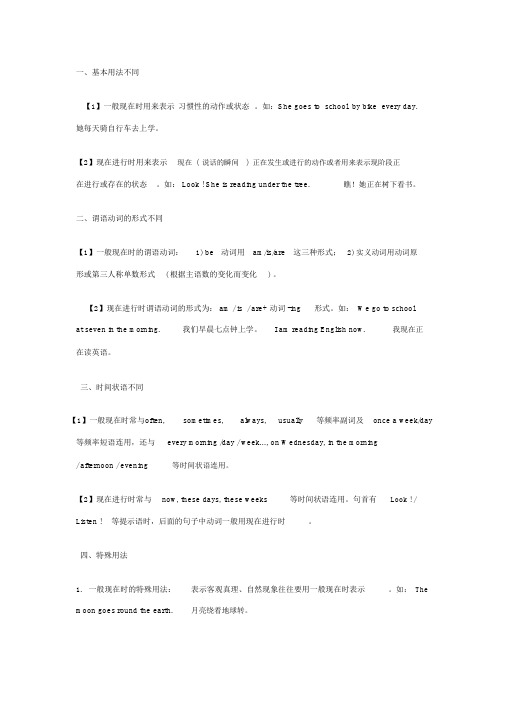
一、基本用法不同【1】一般现在时用来表示习惯性的动作或状态。
如:She goes to school by bike every day.她每天骑自行车去上学。
【2】现在进行时用来表示现在(说话的瞬间)正在发生或进行的动作或者用来表示现阶段正在进行或存在的状态。
如: Look ! She is reading under the tree.瞧!她正在树下看书。
二、谓语动词的形式不同【1】一般现在时的谓语动词:1) be动词用am/is/are这三种形式;2) 实义动词用动词原形或第三人称单数形式( 根据主语数的变化而变化) 。
【2】现在进行时谓语动词的形式为:am / is / are+ 动词 -ing形式。
如:We go to schoolat seven in the morning.我们早晨七点钟上学。
I am reading English now.我现在正在读英语。
三、时间状语不同【1】一般现在时常与o ften, sometimes, always, usually等频率副词及once a week/day 等频率短语连用,还与every morning /day / week..., on Wednesday, in the morning/ afternoon / evening等时间状语连用。
【2】现在进行时常与now, these days, these weeks等时间状语连用。
句首有Look ! / Listen !等提示语时,后面的句子中动词一般用现在进行时。
四、特殊用法1.一般现在时的特殊用法:表示客观真理、自然现象往往要用一般现在时表示。
如:The moon goes round the earth.月亮绕着地球转。
2.现在进行时的特殊用法:现在进行时与always连用时,往往含有赞扬、厌恶、责备等感情色彩。
如: He is always working hard.他总是非常努力地工作。
一般现在时与现在进行时练习题(一)
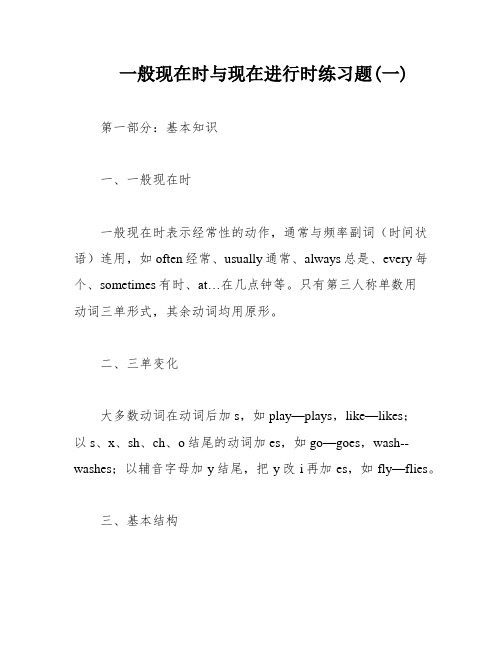
一般现在时与现在进行时练习题(一)第一部分:基本知识一、一般现在时一般现在时表示经常性的动作,通常与频率副词(时间状语)连用,如often经常、usually通常、always总是、every每个、sometimes有时、at…在几点钟等。
只有第三人称单数用动词三单形式,其余动词均用原形。
二、三单变化大多数动词在动词后加s,如play—plays,like—likes;以s、x、sh、ch、o结尾的动词加es,如go—goes,wash--washes;以辅音字母加y结尾,把y改i再加es,如fly—flies。
三、基本结构基本结构为动词原形,如主语为第三人称单数,动词要改为第三人称单数形式。
四、现在进行时现在进行时可表示短暂性动作,而一般现在时表示长久性动作。
如:Lucy is living in Beijing.(短时间居住)XXX XXX.(长久性居住)第二部分:对应练一、写出下列动词的第三人称形式和ing形式。
(20分)1.give—gives。
giving2.—s。
ping3.XXX—moves。
moving4.carry—carries。
carrying5.draw—draws。
drawing6.tell—tells。
telling7.see—sees。
seeing8.wear—wears。
wearing9.watch—watches。
watching10.et—ets。
etting二、用动词的适当形式填空。
(28分)1.We often play in the playground.2.He gets up at six o’clock.1.Do you brush your XXX every morning?2.What does he usually do after school?3.Present continuous XXX:XXX is studying English。
初中一般现在时与现在进行时语法详解及习题
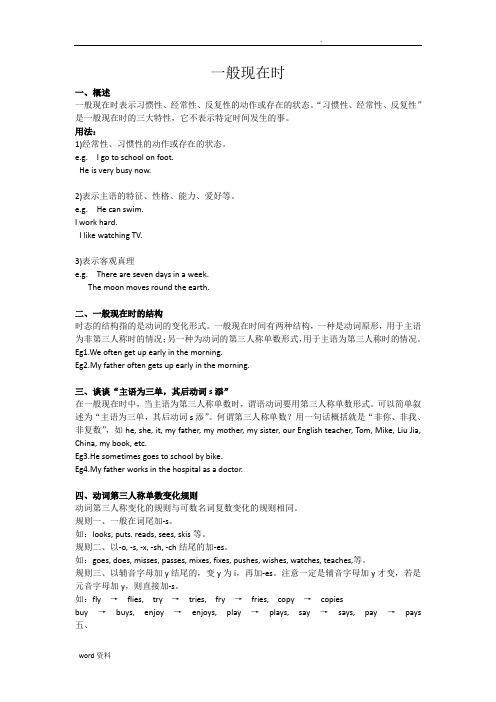
一般现在时一、概述一般现在时表示习惯性、经常性、反复性的动作或存在的状态。
“习惯性、经常性、反复性”是一般现在时的三大特性,它不表示特定时间发生的事。
用法:1)经常性、习惯性的动作或存在的状态。
e.g. I go to school on foot.He is very busy now.2)表示主语的特征、性格、能力、爱好等。
e.g. He can swim.I work hard.I like watching TV.3)表示客观真理e.g. There are seven days in a week.The moon moves round the earth.二、一般现在时的结构时态的结构指的是动词的变化形式。
一般现在时间有两种结构,一种是动词原形,用于主语为非第三人称时的情况;另一种为动词的第三人称单数形式,用于主语为第三人称时的情况。
Eg1.We often get up early in the morning.Eg2.My father often gets up early in the morning.三、谈谈“主语为三单,其后动词s添”在一般现在时中,当主语为第三人称单数时,谓语动词要用第三人称单数形式。
可以简单叙述为“主语为三单,其后动词s添”。
何谓第三人称单数?用一句话概括就是“非你、非我、非复数”,如he, she, it, my father, my mother, my sister, our English teacher, Tom, Mike, Liu Jia, China, my book, etc.Eg3.He sometimes goes to school by bike.Eg4.My father works in the hospital as a doctor.四、动词第三人称单数变化规则动词第三人称变化的规则与可数名词复数变化的规则相同。
规则一、一般在词尾加-s。
语法专题:一般现在时和现在进行时(附练习)
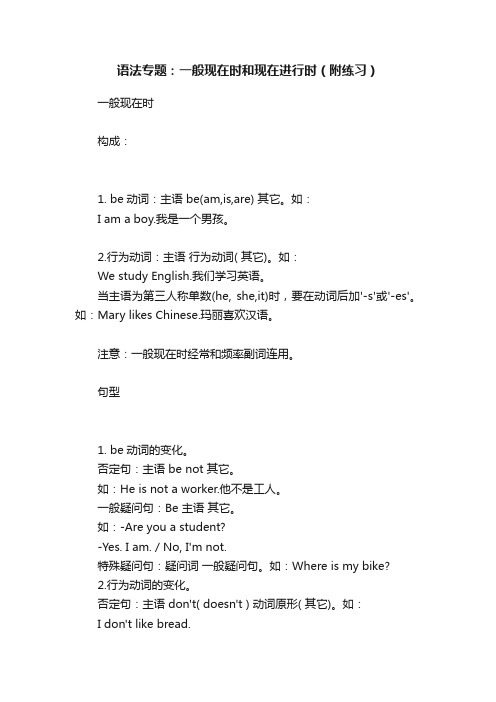
语法专题:一般现在时和现在进行时(附练习)一般现在时构成:1. be动词:主语 be(am,is,are) 其它。
如:I am a boy.我是一个男孩。
2.行为动词:主语行为动词( 其它)。
如:We study English.我们学习英语。
当主语为第三人称单数(he, she,it)时,要在动词后加'-s'或'-es'。
如:Mary likes Chinese.玛丽喜欢汉语。
注意:一般现在时经常和频率副词连用。
句型1. be动词的变化。
否定句:主语 be not 其它。
如:He is not a worker.他不是工人。
一般疑问句:Be 主语其它。
如:-Are you a student?-Yes. I am. / No, I'm not.特殊疑问句:疑问词一般疑问句。
如:Where is my bike?2.行为动词的变化。
否定句:主语 don't( doesn't ) 动词原形( 其它)。
如:I don't like bread.当主语为第三人称单数时,要用doesn't构成否定句。
如:He doesn't often play.一般疑问句:Do( Does ) 主语动词原形其它。
如:- Do you often play football?- Yes, I do. / No, I don't.当主语为第三人称单数时,要用does构成一般疑问句。
如:- Does she go to work by bike?- Yes, she does. / No, she doesn't.特殊疑问句:疑问词一般疑问句。
如:How does your father go to work?动词第三人称单数形式构成规则动词原形变第三人称单数的规则与发音规律同名词单数变复数大致相同,请认真观察。
1、大多数动词在词尾加“S”在清辅音后发音为[s],在浊辅音及元音后发音为 [z]。
一般现在时-现在进行时和一般将来时综合练习题

现在进行时写出下列动词的现在分词agree __________ skate __________ listen __________put __________ say __________ begin __________blow __________ have__________ meet__________look __________ fly__________ swim__________open__________ sit __________ play__________sing __________ do__________ dance__________填空Look, the children____________ (enjoy) themselves in the park.John ____________ (play) basketball now.Mary ____________ (watch) TV at the moment.Her sister ____________ (listen) to music now.Listen, they ____________ (sing) and (dance ).Our teacher ____________ (stand) now.We ____________ (speak) English at the moment.The cat ____________ (eat) its fish now.Tom and Ann ____________ (skate) now.I ____________ (drink) coffee now.用所给词的适当形式填空John often ______ (play) football, but he ______ (play) basketball now.The boys often ______ (swim) in the sea, but they ______ (swim) in the river now.We always ______ (play) in the garden, but we ______ (play) in the park now. Jane often ______ (speak) English, but she ______ (speak) French now.I often ______ (drink) coffee, but I ______ (drink) tea at the moment._____ your son ______ (read) at the moment? No, he ______ (sleep)._____ you ______ (cook) now? No, I ____. I _____ (eat) my lunch.The cat ______ (run) after a cat now.Lily ______ (come) from Shanghai.What are you doing? I ______ (sit) now.Mary ______ (drink) tea now. She ______ (drink) tea every morning.My mother ______ (cook) at the moment.What ______ they (do) now? They ______ (watch) TV._____ you (watch) TV now? No, I ____.______ you often ______ (play)games in the evening ? Yes, I ____.______ Helen working now? No, she ______ (drink) tea.What is she doing? She ______ (write) a letter.What ____ your son _____ (do) now?He ______ (wait) for a bus at the moment.What ____ she ____? She is singing.句型转换She is writing a letter.(对划线部分提问)___________________________________________He is reading a book.(否定句)___________________________________________I am drawing a picture. (对划线部分提问)___________________________________________Mary is cooking. (对划线部分提问)___________________________________________My sister is drawing a cat. (一般疑问句)___________________________________________My parents are watching TV at home. (对划线部分提问)____________________________________________They are speaking English. (否定句)____________________________________________He is playing basketball now. (对划线部分提问)____________________________________________Helen is working at the moment.(一般疑问句)____________________________________________Lily is playing in the park. (对划线部分提问)____________________________________________一般现在时与现在进行时选择1.It’s eight o’clock. The students _____ an English class.A. haveB. is havingC. are having2. Listen! The baby _____ in the next room.A. cryingB. criedC. is cryingD. cries3. Tom is a worker. He _____ in a factory. His sisters _____ in a hospital.A. work/ workB. works/ workC. work/ works4. Who _____ English best in your class?A. speakB. speaksC. speaking5. Mrs Read _____ the windows every day.A. is cleaningB. cleanC. cleans6. We _____ music and often _____ to music.A. like/ listenB. like/ are listening7. On Sunday he sometimes _____ his clothes and sometimes _____ some shopping.A. wash/ doB. is washing/ is doingC. washes/ does8. The twins usually _____ milk and bread for breakfast, but Jim _____ some coffee for it.A. have/ haveB. have/ hasC. has/ have二.用所给词的适当形式填空1.. Look! He is______ (wait) for you now.2. I always______ (have) breakfast at home.3. A bird is ______ (fly) over the house. She is (look) at it.4. What are you doing now? I______ (walk) over the bridge.5. He ______ (talk) to his friends at the moment.6.She ______ (read) a magazine in the room now.7.There ______ (be) some milk in the cup.8.Listen! The children______ (sing).9. ______ his brother (clean) his teeth every day?10 My sister ______ (not) doing her homework.11. Can you______ (see) the plane in the sky?12. You can ______ (put) it in your pocket.13. How about ______ (swim) at the pool? It sounds great.14. Let’s ______ (read) an interesting story-book.15.Here ______ (be) some hot water for you.16.He always______ (watch) TV at home.17. John often (play) football, but he (play) basketball now.18. Mary often (watch) TV at night, but she (listen) to the stereo at the moment19. I often (drink) coffee, but I (drink) tea at the moment.20. The boys often (swim) in the sea, but they (swim) in the river now.三.翻译句子1.李平不是在读书,她在写信。
一般现在时和现在进行时时态练习及讲解
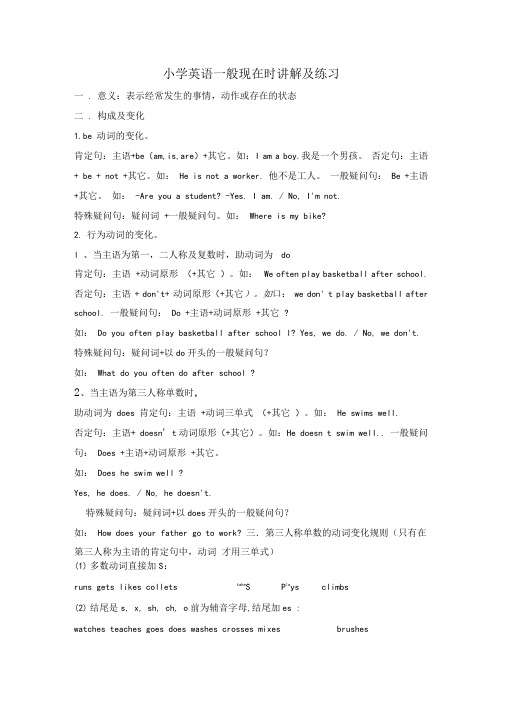
小学英语一般现在时讲解及练习一. 意义:表示经常发生的事情,动作或存在的状态二. 构成及变化1.be 动词的变化。
肯定句:主语+be(am,is,are)+其它。
如:I am a boy.我是一个男孩。
否定句:主语+ be + not +其它。
如:He is not a worker. 他不是工人。
一般疑问句:Be +主语+其它。
如:-Are you a student? -Yes. I am. / No, I'm not.特殊疑问句:疑问词+一般疑问句。
如:Where is my bike?2.行为动词的变化。
l 、当主语为第一,二人称及复数时,助动词为do肯定句:主语+动词原形(+其它)。
如:We often play basketball after school. 否定句:主语+ don't+ 动词原形(+其它)。
如口:we don' t play basketball after school. 一般疑问句:Do +主语+动词原形+其它?如:Do you often play basketball after school l? Yes, we do. / No, we don't. 特殊疑问句:疑问词+以do开头的一般疑问句?如:What do you often do after school ?2、当主语为第三人称单数时,助动词为does 肯定句:主语+动词三单式(+其它)。
如:He swims well.否定句:主语+ doesn' t动词原形(+其它)。
如:He doesn t swim well.. 一般疑问句:Does +主语+动词原形+其它。
如:Does he swim well ?Yes, he does. / No, he doesn't.特殊疑问句:疑问词+以does开头的一般疑问句?如:How does your father go to work? 三.第三人称单数的动词变化规则(只有在第三人称为主语的肯定句中,动词才用三单式)(1)多数动词直接加S:runs gets likes collets take S P la ys climbs(2)结尾是s, x, sh, ch, o前为辅音字母,结尾加es :brusheswatches teaches goes does washes crosses mixes(3)动词末尾y前为辅音:将y改为i加es: study —studies fly —flies carry —carries cry —cries但在y前如果为元音则直接加s: buys says四.时间标志:always , usually , ofte n , sometimes ,every一般现在时练习题(1)I.用下列单词的适当形式填空1.We often __________ (play) in the playgro und.2.He _________ (get) up at six o ' clock.3. _________ you ___________ (brush) your teeth every morning?4.What _________________ (do) he usually _________________ (do) after school?5.Da nny _________________ (study) En glish, Chin ese, maths, scie nee and Art atschool.6.Mike sometimes __________ (go) to the park with his sister.7.At eight at ni ght, she ______ (watch) TV with his pare nts.8. _______ Mike _________ (read) En glish every day?9.How many lessons __________ your classmates _________ (have) on Mon day?10.What time ________ his mother __________ (do) the housework?11.句型转换1.Do you often play football after school?(改为肯定句)2.1have many books.(改为否定句)3.Gao Shan ' s sister likes playingpble tennis (改为否定句)4.She lives in a small tow n near New York.(改为一般疑问句)5.1watch TV every day.(改为一般疑问句)6.We have four lessons.(改为否定句)7.Nancy doesn ' t run fast(改为肯定句)8.My dog runs fast.(改为否定句)9.Mike has two letters for him.一般疑问句:_________________________________________________ 否定句:___________________________________________________ 10.1usually play football on Friday after noon.否定句: ____________________________________________________ 一般疑问句:_______________________________________________ 划线提问:___________________________________________________ 11.Su Yang usually washes some clothes on Saturday.否定句: ____________________________________________________ 一般疑问句:_______________________________________________ 划线提问:_________________________________________________ 12.Mingming usually waters the flowers every day.否定句: ____________________________________________________ 一般疑问句:_______________________________________________ 13.Tom does his homework at home.否定句: ____________________________________________________ 一般疑问句:_______________________________________________ 一般现在时练习题(2)一、用所给动词的真确形式填空1.I like ____________ (swim).2. ___________ He (read) English every day.3. ___________ We (go)to school at seven in the morning.4. ___________ Mike (go)to school at seven in the morning.5. ________________ My mother ___ (like) (go) shopping.6.I can ________ (draw) many beautiful pictures.7.She __________ (make) a model plane.8.Do you _________ (like) ________ (run)?9.Does he ___________ (like) ______ (jump) ?10. __________________ Does Nancy (grow)flowers on Saturday ?11. __________________ The teachers _____ (like) (dance).12. __________________ The teacher ______ (like) (dance).13. _____________________ The students (speak) English in class.14. __________________ The student (speak) Chinese after class.15.Let ' s _____________ a nd play football . (go)16.He ______________ like swimming . (not)17.I ' m sorry _____________ that . (hear)18.Wang Bing is _____________ (write) an E-mail to his friend .19.He has ______________ a headache . (get)20. _______ you study English at school ? Yes , I _________ . (do)21. _________ your sister study English at school ? No , she _______ . (do)22.I ' m __________ better . (feel)23.Why ___________ Tom absent today ? (be)二、用所给的人称改写句子1.I take photos on Sunday. (Mike)2.We grow beautiful flowers. (she)3.They like collecting stamps. (Ben)4.I listen to music carefully. (my aunt)5.You like making a model ship. (Helen)6.We clean the classroom every day. (he)7.They look after the pandas. (Mr Wang)8.I draw a tree and some flowers. (Nancy) 9.We go to bed at eight. (my sister)10.I read newspapers in the evening. (Mr Green)小学现在进行时讲解及练习题1、概念:现在进行时表示说话时正在发生的事情或状态。
(完整)一般现在时讲解与练习(初中英语)
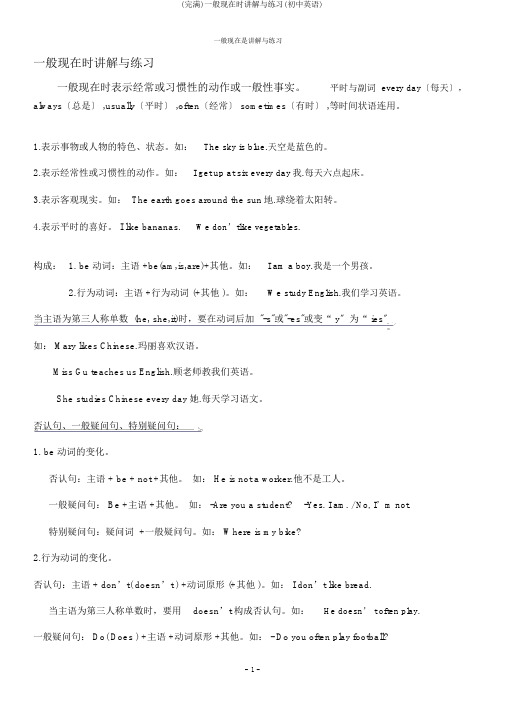
一般现在是讲解与练习一般现在时讲解与练习一般现在时表示经常或习惯性的动作或一般性事实。
平时与副词 every day〔每天〕,always〔总是〕 ,usually〔平时〕 ,often〔经常〕 sometimes〔有时〕 ,等时间状语连用。
1.表示事物或人物的特色、状态。
如:The sky is blue.天空是蓝色的。
2.表示经常性或习惯性的动作。
如:I get up at six every day我.每天六点起床。
3.表示客观现实。
如: The earth goes around the sun地.球绕着太阳转。
4.表示平时的喜好。
I like bananas.We don’tlike vegetables.构成: 1. be 动词:主语 +be(am,is,are)+其他。
如:I am a boy.我是一个男孩。
2.行为动词:主语 +行为动词 (+其他 )。
如:We study English.我们学习英语。
当主语为第三人称单数 (he, she,it)时,要在动词后加 "-s"或"-es"或变“ y〞为“ ies〞如: Mary likes Chinese.玛丽喜欢汉语。
Miss Gu teaches us English.顾老师教我们英语。
She studies Chinese every day她.每天学习语文。
否认句、一般疑问句、特别疑问句:1. be 动词的变化。
否认句:主语 + be + not +其他。
如: He is not a worker.他不是工人。
一般疑问句: Be +主语 +其他。
如: -Are you a student?-Yes. I am. / No, I’m not.特别疑问句:疑问词 +一般疑问句。
如: Where is my bike?2.行为动词的变化。
否认句:主语 + don’t( doesn’t ) +动词原形 (+其他 )。
一般现在时-将来时和现在进行时的讲解与练习
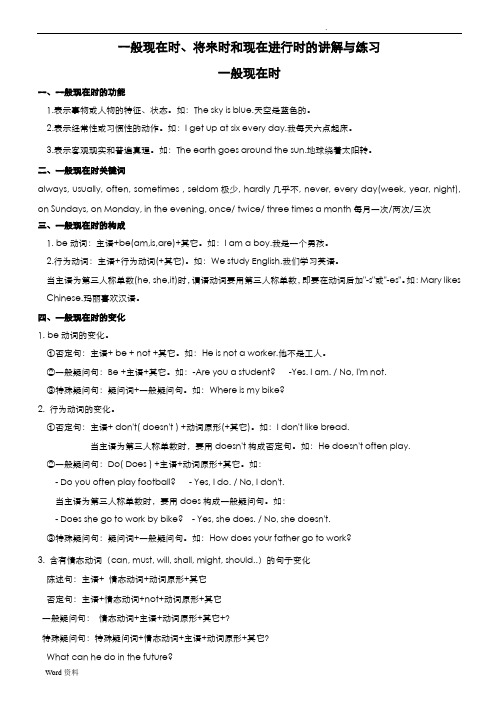
一般现在时、将来时和现在进行时的讲解与练习一般现在时一、一般现在时的功能1.表示事物或人物的特征、状态。
如:The sky is blue.天空是蓝色的。
2.表示经常性或习惯性的动作。
如:I get up at six every day.我每天六点起床。
3.表示客观现实和普遍真理。
如:The earth goes around the sun.地球绕着太阳转。
二、一般现在时关键词always, usually, often, sometimes , seldom极少, hardly几乎不, never, every day(week, year, night), on Sundays, on Monday, in the evening, once/ twice/ three times a month每月一次/两次/三次三、一般现在时的构成1. be动词:主语+be(am,is,are)+其它。
如:I am a boy.我是一个男孩。
2.行为动词:主语+行为动词(+其它)。
如:We study English.我们学习英语。
当主语为第三人称单数(he, she,it)时,谓语动词要用第三人称单数,即要在动词后加"-s"或"-es"。
如:Mary likes Chinese.玛丽喜欢汉语。
四、一般现在时的变化1. be动词的变化。
①否定句:主语+ be + not +其它。
如:He is not a worker.他不是工人。
②一般疑问句:Be +主语+其它。
如:-Are you a student? -Yes. I am. / No, I'm not.③特殊疑问句:疑问词+一般疑问句。
如:Where is my bike?2. 行为动词的变化。
①否定句:主语+ don't( doesn't ) +动词原形(+其它)。
如:I don't like bread.当主语为第三人称单数时,要用doesn't构成否定句。
七年级下册英语时态专项-一般现在时-现在进行时-一般过去时-讲解与测试

一、一般现在时:概念:经常、反复发生的动作或行为及现在的某种状况。
时间状语:always, usually, often, sometimes, every week (day, year, month…), once a week, on Sundays, etc.基本结构:①be动词;②行为动词否定形式:①am/is/are+not;(isn't,aren't)②此时态的谓语动词若为行为动词,则在其前加don't,如主语为第三人称单数,则用doesn't,同时还原行为动词。
一般疑问句:①把be动词放于句首;②用助动词do提问,如主语为第三人称单数,则用does,同时,还原行为动词。
即:含be动词的一般现在时结构:肯定句:主语+ be+ 其它。
否定句:主语+ be+not + 其它。
一般问句:Be+主语+ 其它特殊疑问句:(特殊疑问词+一般疑问句)特殊疑问词+be+主语+其它含实义动词的一般现在时结构:肯定句:主语+动词原形/动词三单形式+其它。
否定句:主语+don't/doesn't+动词原形+其它。
一般问句:Do/Does+主语+动词原形+其它特殊疑问句:(特殊疑问词+一般疑问句)特殊疑问词+do/does+主语+动词原形+其它一、写出下列动词的单三形式:(一)2. catch _________3. brush_________4. wash___________5. do________6. like________7. have___________8. watch ___________9. drink ___________ ___________brush________(二)study_______ stay _____ make ___look ____ pass____ carry ____ come_______ watch_____ plant______ teach_______二、用括号内动词的适当形式填空。
初中一般现在时和现在进行时讲解及练习题
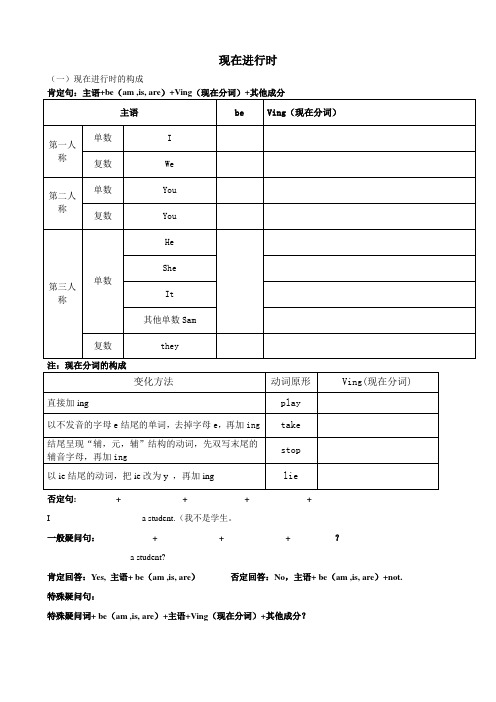
现在进行时(一)现在进行时的构成肯定句:主语+be(am ,is, are)+Ving(现在分词)+其他成分注:现在分词的构成否定句: + + + +I ________ __________ a student.(我不是学生。
一般疑问句:+ + + ?_________ _________ a student?肯定回答:Yes, 主语+ be(am ,is, are)否定回答:No,主语+ be(am ,is, are)+not. 特殊疑问句:特殊疑问词+ be(am ,is, are)+主语+Ving(现在分词)+其他成分?(二)不用于现在进行时的动词:1)表示事实状态的动词,如have, belong, possess, cost, owe, exist, include, contain, matter, weigh, measure, continue等。
I have two brothers. 我有两兄弟。
This house belongs to my sister. 这房子是我姐的。
2)表示心理状态的动词,如know, realize, think see, believe, suppose, imagine, agree, recognize, remember, want, need, forget, prefer, mean, understand, love, hate等。
I need your help. 我需要你的帮助。
He loves her very much. 他爱她很深。
3)瞬间动词,如accept, receive, complete, finish, give, allow, decide, refuse等。
I accept your advice. 我接受你的劝告。
4)系动词,如seem, remain, lie, see, hear, smell, feel, taste, get, become, turn等。
完整版初中一般现在时和现在进行时讲解练习及答案

一般现在时和现在进行时一般现在时用法:1.现阶段经常性习惯性动作或存在的状态I leave home for school at 7 every morning.2.客观真理,客观存在,科学事实The earth moves around the sun.Shanghai lies in the east of China・3.在格言或警句中Pride goes before a fall.骄者必败。
常用时间状语:sometimes, often, every day, usually, always 等构成:1 •动词用原形Ilikeit.2.当主语是第三人称单数时,动词要加・s(・es) She likes it.3.be 动词用am, is, areI am a teacher・He is a boy. They are girls・否定形式:l.don '动t+词原形I don ' t like it. They don t like it.2•当主语是第三人称单数时,则为doesn'动t+词原形He doesn ' t like it.一般疑问句:把do或does放在主语的前面,后面动词用原形Do you like it? Does Ann like it?注意:动词三单的变化规则【巩固练习】写出下列动词的第三人称单数drink ________ stay __________ l ook __________ have ________ do __________ pass _______ caixy _________ come _________ watch ______ brush _________1._____________ M i*s・ Smith the windows every day.A.is cleaningB. cleanC. cleans2.0n Sunday he sometimes ________ h is clothes and sometimes ________ some shopping・A. wash/ do B・ is washing/ is doing C・ washes/ does3.She ______ up at six in the morning・ A. get B. gets C. getting现在进行时1 •定:表示正在生或行的作构:be (am, is, are)+ 在分形式(写:be+ -ing)A、述句(肯定句)主 + be(am, is, a re)+ 在分,女D :I am reading English.我正在英。
一般现在时与现在进行时讲解及练习

1.be 动词的一般现在时的句式: 肯定句:主语+be+表语(n., adj.等)
e.g. He is a worker. You are thirteen. They are in the classroom. e.g. He is not a worker. You aren’t thirteen. They aren’t in the classroom.
B 5.He often _________ supper at 6:00 in the evening.
A. have B. has C. is having D. has got C 6. We _____________ any Chinese classes on Friday.
A. don’t has C. don’t have B. doesn’t have D. are have
B 1.I want____homework now. (A)doing (C)to do my (B)to do (D)do my
C 2.It's time______.
(A)go to school (C)to go home homeworks (B)play games (D)to do my
e.g. What is he? What color is that bird? How old are you? Where are they ?
特殊疑问句:疑问词+be+主语?
2.实义动词的一般现在时句式:
肯定句:主语(I/We/You/They)+实义动词+其他 e.g. I stay at home on Saturdays. They have sports every day. 主语(He/She/It)+实义动词三单现形式+其他 e.g. He stays at home on Saturdays. Lucy has sports every day. 否定句:主语(I/We/You/They)+do+ not+动词原形+其他 e.g. I don’t stay at home on Saturdays. They don’t have sports every day. 主语(He/She/It)+does +not+动词原形+其他 e.g. He doesn’t stay at home on Saturdays. Lucy doesn’t have sports every day. 一般疑问句:Do+主语(I/we/you/they)+动词原形+其他? e.g. Do you stay at home on Saturdays? Do they have sports every day? Does+主语(he/she/it)+动词原形+其他? e.g. Does he stay at home on Saturdays? Does Lucy have sports every day?
七年级一般现在时和现在进行时讲解与习题

七年级一般现在时和现在进行时讲解与习题一般现在时与现在进行时的区别一般现在时表示经常性或习惯性的动作或存在的状态,或表示说话者的能力,或普遍真理。
【用法】1)经常性、习惯性的动作或存在的状态。
I go to school on foot on weekdays. / He is very busy every day.2)表示主语的特征、性格、能力、爱好等。
He can swim. / I work hard./ She likes watching TV.3)表示客观真理There are seven days in a week./ The moon moves round the earth.【标志】often(经常),usually(通常),sometimes(有时) ,always(总是) ,never(从不) , on Sundays(在星期天) , every day/month/year (每一天 /月 /年)【针对练习】1.My father always __________(come) back from work very late.2.Where __________ you __________ (have) lunch every day?3.I often _____(get) up at half past six.4.He ____(like) eating apples.★现在进行时:【结构】 be(am, is, are)+ 现在分词doing写出下列动词的现在分词形式1. work___________ sing__________ play__________study__________2. dance__________ have__________ write__________take__________make__________3. run_________ sit___________shop__________swim__________begin_________get__________put__________4. lie__________(以ie 结尾的动词,把ie 改为y, 再加ing)tie_________【用法】1)表示现在(说话瞬间)正在进行或发生的动作。
(完整版)一般现在时的讲解及练习题
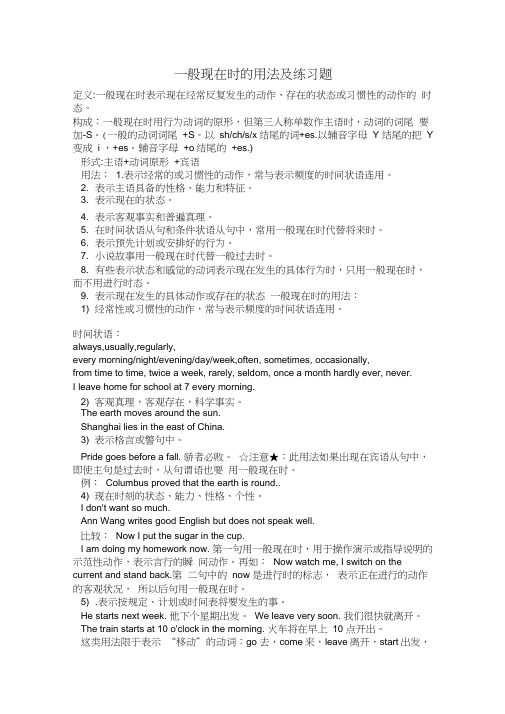
一般现在时的用法及练习题定义:一般现在时表示现在经常反复发生的动作、存在的状态或习惯性的动作的时态。
构成:一般现在时用行为动词的原形,但第三人称单数作主语时,动词的词尾要加-S。
(一般的动词词尾+S。
以sh/ch/s/x结尾的词+es.以辅音字母Y 结尾的把Y 变成i ,+es。
辅音字母+o结尾的+es.)形式:主语+动词原形+宾语用法: 1.表示经常的或习惯性的动作,常与表示频度的时间状语连用。
2. 表示主语具备的性格、能力和特征。
3. 表示现在的状态。
4. 表示客观事实和普遍真理。
5. 在时间状语从句和条件状语从句中,常用一般现在时代替将来时。
6. 表示预先计划或安排好的行为。
7. 小说故事用一般现在时代替一般过去时。
8. 有些表示状态和感觉的动词表示现在发生的具体行为时,只用一般现在时,而不用进行时态。
9. 表示现在发生的具体动作或存在的状态一般现在时的用法:1) 经常性或习惯性的动作,常与表示频度的时间状语连用。
时间状语:always,usually,regularly,every morning/night/evening/day/week,often, sometimes, occasionally,from time to time, twice a week, rarely, seldom, once a month hardly ever, never.I leave home for school at 7 every morning.2) 客观真理,客观存在,科学事实。
The earth moves around the sun.Shanghai lies in the east of China.3) 表示格言或警句中。
Pride goes before a fall. 骄者必败。
☆注意★:此用法如果出现在宾语从句中,即使主句是过去时,从句谓语也要用一般现在时。
例:Columbus proved that the earth is round..4) 现在时刻的状态、能力、性格、个性。
一般现在时与现在进行时构成及练习
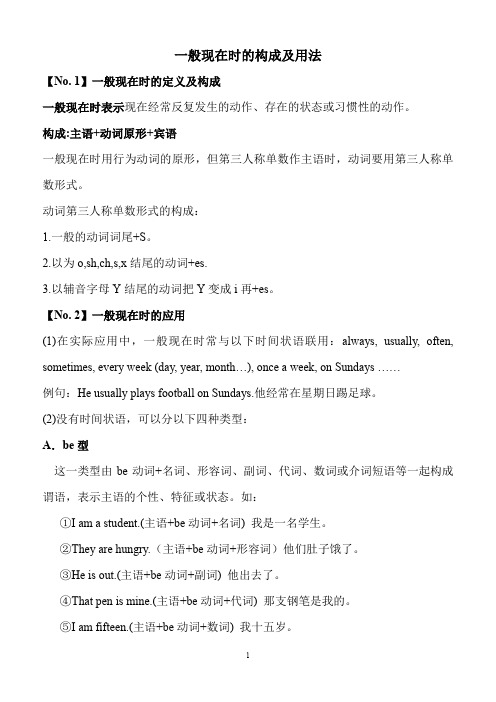
一般现在时的构成及用法【No. 1】一般现在时的定义及构成一般现在时表示现在经常反复发生的动作、存在的状态或习惯性的动作。
构成:主语+动词原形+宾语一般现在时用行为动词的原形,但第三人称单数作主语时,动词要用第三人称单数形式。
动词第三人称单数形式的构成:1.一般的动词词尾+S。
2.以为o,sh,ch,s,x结尾的动词+es.3.以辅音字母Y结尾的动词把Y变成i再+es。
【No. 2】一般现在时的应用(1)在实际应用中,一般现在时常与以下时间状语联用:always, usually, often, s ometimes, every week (day, year, month…), once a week, on Sundays ……例句:He usually plays football on Sundays.他经常在星期日踢足球。
(2)没有时间状语,可以分以下四种类型:A.be型这一类型由be动词+名词、形容词、副词、代词、数词或介词短语等一起构成谓语,表示主语的个性、特征或状态。
如:①I am a student.(主语+be动词+名词) 我是一名学生。
②They are hungry.(主语+be动词+形容词)他们肚子饿了。
③He is out.(主语+be动词+副词) 他出去了。
④That pen is mine.(主语+be动词+代词) 那支钢笔是我的。
⑤I am fifteen.(主语+be动词+数词) 我十五岁。
⑥The bike is under the tree.(主语+be动词+介词短语) 那辆自行车在树下。
B.do型do型由行为动词充当谓语,表示经常性或习惯性的动作,其构成为“主语+动词原形或动词第三人称单数形式”。
如:①I know it. 我知道这。
②He believes me. 他相信我。
C.there be型there be型句子表示“存在”,其构成为“there be+主语+其他”,表示客观事实。
- 1、下载文档前请自行甄别文档内容的完整性,平台不提供额外的编辑、内容补充、找答案等附加服务。
- 2、"仅部分预览"的文档,不可在线预览部分如存在完整性等问题,可反馈申请退款(可完整预览的文档不适用该条件!)。
- 3、如文档侵犯您的权益,请联系客服反馈,我们会尽快为您处理(人工客服工作时间:9:00-18:30)。
17.__are you eating? I'm eating__meat. (A)What,some (B)Which,any (C)Where,not (D)What,a 18.They______TV in the evening. They do their homework. (A)are watching (B)can't watching (C)don't watch (D)don't watchig
感谢您的关注
14.我在照看孩子. (A)I am looking after the baby. (B)I'm look aftering the baby. (C)I looking after the baby.
15.What are you listening_____? (A)/ (B)for (C)at (D)to 16.我正在听他说话. (A)I listening to him. (B)I'm listening to him. (C)I'm listen to him. (D)I'm listening him.
一般现在时 表示现在的状态
一般现在时:表示经常或习惯性的动常与 5. Who _____ English bestevery in your usually, often, always, day, class? sometimes, once a month, never, A. speak B. speaks C. speaking Mondays 等时间状语连 用 6. Mrson Read ___ the windows every day. A. is cleaning B. clean C. cleans 7. We __ music and often __ to music. A. like/ listen B. likes/ listens C. like/ are listening
一般现在时和现在进行时练习 题
LOGO
现在进行时可以表示说话时正在发生
的动作,常和now,at this moment
等时间状语及动词look,listen
等连用,这是现在进行时的“
暂时性”特征。
LOGO
3. Don’t talk here. Grandparents _____. A. is sleeping B. are sleeping C. sleeping D. sleep 4. Tom is a worker. He _____ in a factory. His sisters _____ in a hospital. A. work/ work B. works/ work C. work/ works
1. Who ___ over there now? A. singing B. are sing C. is singing D. sing 2. It’s eight o’clock. The students _____ an English class. A. have B. having C. is having D. are h at six in the morning. A. get B. gets C. is getting 12. On Sunday he sometimes _____ his clothes and sometimes _____ some shopping. A. wash/ do B. is washing/ is doing C. washes/ does 13. The twins usually _____ milk and bread for breakfast, but Jim _____ some coffee for it. A. have/ have B. have/ has C. has/ have
comes 1. My father always _______(come) back from work very late. sleeps 2. The teacher is busy. He __________ (sleep) six hours a day. is singing 3. Listen! Joan __________(sing) in the sings classroom. She often __________ (sing) there. Do know 4. __________ your brother __________(know) Japanese? do you____ have(have) lunch every day? 5. Where ___
8.____are the birds doing? They are singing in a tree. (A)Who (B)What (C)How 9.Is she____something? (A)eat (B)eating (C)eatting 10.你在干什么? (A) What are you do? (B)What are you doing? (C)What do you do?
三、写出下列动词的现在分词形式 1. work___ sing__ play___ study_____ 2. dance__ have__ write___ take___ 3. run___ sit____ shop____ swim___ 四、写出下列动词的第三人称单数形式 1. work___ read__ clean___ write__ 2. teach__ wash__ guess___ watch___ 3. go___ do_____ 4. study___ fly____ cry____ play__ 5. have___
